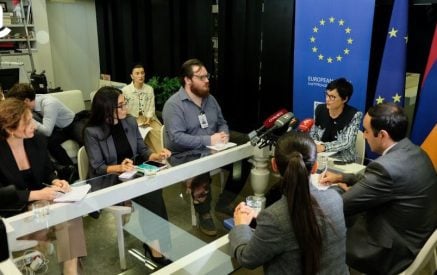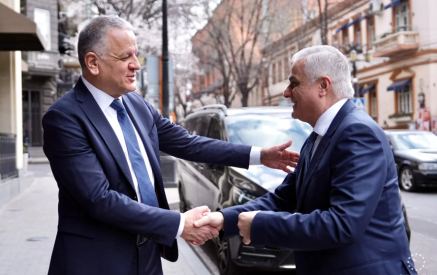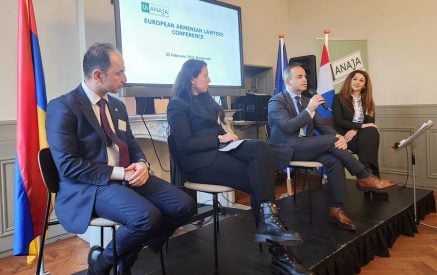
28-29 November 2012
Brussels
Read also
Final Statement and Recommendations
pursuant to Article 83 of the Partnership and Cooperation Agreement
Under the co-chairmanship of Mr Milan CABRNOCH (European Conservatives and Reformists Group) and Mr. Samvel FARMANYAN (Republican Party of Armenia), the 13th meeting of the EU-Armenia Parliamentary Cooperation Committee (PCC) was held inBrusselson 28-29 November 2012. The Committee heard MrJohn KJAER, from the European External Action Service and Mr. Avet ADONTS, Ambassador of Armenia to the EU, representing the Government of theRepublicofArmenia.
The Parliamentary Cooperation Committee
on the state of play of Armenia-EU relations
1. applauds the intensification of Armenia-EU relations over the last years and the opening of ambitious perspectives for cooperation in the political, economic, cultural and other fields;
2. reminds that Armenia’s active participation in multilateral parliamentary cooperation in the framework of Euronest provides an example of commitment to European values and principles, the importance of which is acknowledged by a wide public consensus in Armenian society; welcomes Armenia’s readiness to host the Euronest Plenary Session in 2014;
3. welcomes the dynamic political dialogue betweenArmenia and EU as demonstrated by recent productive high-level visits inYerevan /Brussels;
4. is encouraged by both the fact that all stakeholders met by EP Observers in the framework of the May 2012 general elections underscored their commitment to international standards, and by the progresses witnessed by the EP Delegation to the IEOM; stresses it is important to see the OSCE/ODIHR relevant findings and recommendations as the beginnings of a process, and not as an end, in view of the upcoming presidential elections;
on the EU-Armenia Association Agreement
5. welcomes that negotiations on the EU-Armenia Association Agreement have been progressing at a good pace in line with the adoption of the European Parliament Resolution of 18 April 2012 on negotiations of the EU-Armenia Association Agreement; further recognises Armenia’s European aspirations and considers them a catalyst leading to the strengthening of Armenia’s commitment to the principles of the rule of law, respect for human rights and good governance;
6. calls upon the negotiating Parties to exert all efforts to finalize negotiations of the Association Agreement and the Deep and Comprehensive Free Trade Agreement (DCFTA), if possible before the EaP Vilnius summit;
7. stresses that the Association Agreement ought to provide a comprehensive and forward-looking framework for the future development of relations betweenArmenia and the EU, enhancing political association, economic integration and legal approximation;
8. welcomes that a strong parliamentary dimension is to be included in the Association Agreement, providing for the full involvement of the National Assembly of Armenia and the European Parliament in its implementation and monitoring;
9. emphasises the importance of including in the Association Agreement provisions on the fundamental freedoms, including the freedom of assembly and association, the development of civil society, the rule of law, the continued fight against corruption, ensuring market competitiveness, and the independence of the media;
10. warmly welcomes the incorporation of EU best practices and recommendations in Armenia during the preparation of national work plans in the field of justice, freedom and security; notes, in particular, the tangible results achieved in the migration sector by the signing of the Joint Declaration on Mobility Partnership;
11. takes note of the European Parliament Plenary calling on the need to adopt legislation to prohibit discrimination on any ground, encourages further strengthening of the office of Human Rights Defender, by providing him both additional financial and human resources;
12. welcomes the finalisation of the negotiations of the EU-Armenia Visa Facilitation and Readmission Agreements and calls for its prompt signing and ratification and effective implementation; reaffirms the shared objective of visa-free travel for the citizens of theRepublic ofArmenia in due course provided that the conditions for well-managed and secure mobility are in place;
13. welcomes the decision ofArmenia to lift, as from 10 January 2013, for all citizens of the EU & Schengen-area Member States, visa requirements when travelling toArmenia;
on EU assistance
14. fully recognises Armenia’s ambitious reform agenda under the EaP and calls for adequate assistance to be provided in accordance with the ‘more for more’ principle; welcomes the launch of preparatory work for an international donors conference next year to further boost reforms, stressing that the EU would expect the “Upgrading Armenia” proposal to build upon the country’s own Sustainable Development Strategy”;
15. shares the belief that the EU could provide better-targeted financial and technical assistance to ensure that Armenia could meet the commitments stemming from the negotiations on the Association Agreement and the DCFTA as its integral part, by continuing to offer Comprehensive Institution-Building programmes, including such areas as economic governance, civil service, justice reform and the parliamentary dimension; welcomes the work of the High-Level EU Advisory Group and calls for sustained continuation of its increasingly effective mission in advising on the strategy and implementation of the Association Agreement and DCFTA in particular;
on regional stability issues
16. believes there can be no alternative to the peaceful solution of the Nagorno-Karabakh conflict; deplores the lack of progress in the negotiation process and stresses the importance to move beyond the current status-quo towards a secure and prosperous future;
17. reiterates its support to the work of the OSCE Minsk Group co-chairs for the peaceful resolution of the Nagorno-Karabakh conflict and to the set of Madrid principles, without exception, presented by the Presidents of the Minsk Group Co-Chair Countries: France, the USA and Russia, in their 2009 L’Aquila and 2010 Muskoka joint statements, also fully supports the Deauville statement of 26 May 2011 of the three Presidents, which calls on all the parties to the conflict to take decisive step towards a peaceful settlement of the conflict, as well as the Los Cabos statement of 18 June 2012; stresses the importance of reaching an agreement on Basic Principles for settlement of the Nagorno-Karabakh conflict as an important step towards a comprehensive peace agreement to ensure lasting and sustainable peace; further stresses the importance of creating suitable conditions for a future legally-binding free expression of will concerning a final status solution;
18. underlines the value of confidence-building measures, including withdrawal of snipers from the line of contact, in accordance with the OSCE recommendations;
19. supports and calls for the establishment of a mechanism for active incident-prevention and the independent investigation of cease-fire violations along the line of contact as stated in the joint statement of the Presidents of Armenia, Azerbaijan and Russia at the March 2011 summit in Sochi, reiterated by the OSCE Minsk Group co-chairs and accepted by Armenia;
20. states that the EU must play a more active role in further supporting confidence building measures to spread the ideas of peace, reconciliation and trust among all sides of the Nagorno-Karabakh conflict despite not being a member of the OSCE Minsk Group, and underlines in this respect the value it attaches to unconditional access for EU representatives, including Members of the European Parliament to the region;
21. deplores the decision by the President of Azerbaijan to pardon Ramil Safarov, a convicted murderer sentenced by the courts of a Member State of the European Union, and expresses its deep concern over his subsequent glorification after his extradition to Azerbaijan; regards this gesture as not only contrary to the spirit of international law but as contributing to further tensions in the region, exacerbating feelings of injustice; condemns any provocation that would add further tension to an already tense and fragile situation;
22. is deeply concerned that such acts could jeopardise reconciliation attempts and further undermine the future development of peaceful people-to-people contact in the region, which is a significant way to achieve lasting and sustainable peace;
23. welcomes all statements contributing to the peaceful settlement of the conflict and reminds that regarding the planned opening of an airport in Nagorno-Karabakh, the OSCE Minsk Group Co-Chairs have received renewed assurances from all sides that, in accordance with international law, they reject any threat or use of force against civil aircraft and will refrain from politicizing the issue;
24. deplores the non-ratification of the two Armenia-Turkey protocols, signed in Zurich in 2009, in that context urges all parties, Turkey in particular, to meet their commitments; stresses the importance of ratifying the Zurich protocols and stepping up efforts to facilitate the normalisation of relations without any preconditions, with the subsequent opening of the unilaterally closed border;
25. believes that the Armenia-Turkey normalization process and the OSCE Minsk Group negotiations should not be linked and supports all initiatives aimed at facilitation of regional cooperation, thus ending the policies of economic isolation of any country in the region;
26. recalls the European Parliament resolution of 1987 on recognition of the Armenian Genocide; is however encouraged by the fact that the issue has, in recent years, become the focus of open and public debate in Turkey itself, which could contribute to reconciliation between the two neighbouring nations ensuring their peaceful co-existence and lasting cooperation;
on sectoral issues
27. welcomes increasing sectoral cooperation between the institutions of EU and Armenia, and expresses its satisfaction with the efforts of the Armenian Government, which have led to launching of the DCFTA negotiations on 19 June 2012;
28. notes the European Parliament’s encouragement to Armenia to fully utilise the potential of DCFTA to boost its economy, export opportunities and access to the EU market, by upgrading its national standards, and stresses the importance of implementation of the areas such as technical regulations, sanitary and phytosanitary standards, and intellectual property;
29. further welcomesArmenia’s decision to rejoin the WTO Plurilateral Agreements on Public Procurement on 15 September 2011;
30. welcomes the accession ofArmenia, with observer status, to the Energy Community, which can contribute to improving regional energy cooperation through a better regulatory framework for future partnerships between the EU and partner countries;
31. takes note of the value the European Parliament attaches to the ratification of the Rome Statute of the International Criminal Court, especially from countries with a European aspiration;
32. emphasises the potential benefits of using the Association Agreement as a platform to promote regional synergies and cooperation, notably in the areas of transport and energy;
33. finally supports the integration and active engagement of Armenian political forces into the European Union political families with the continuous assistance of the EU Advisory Group.





















































